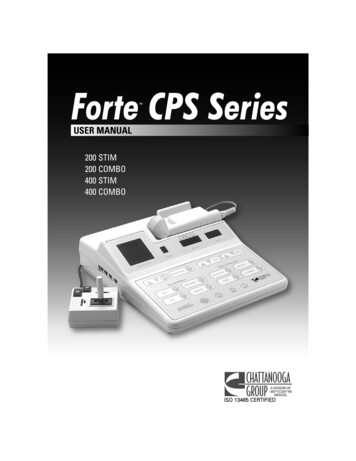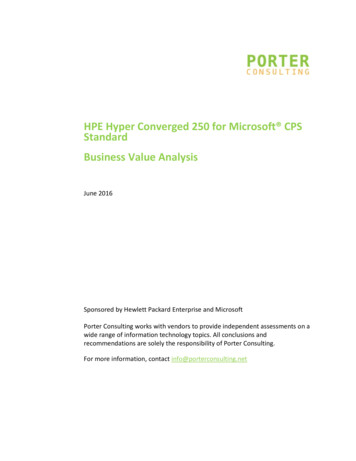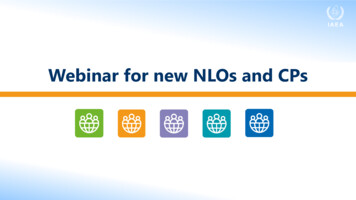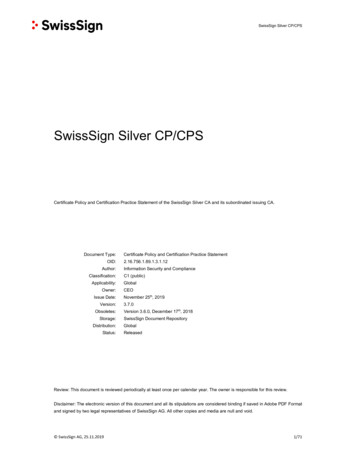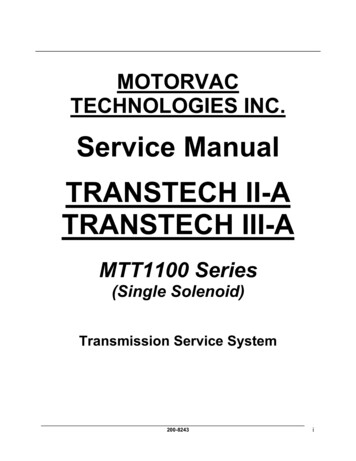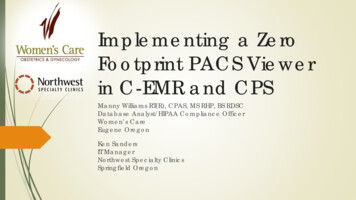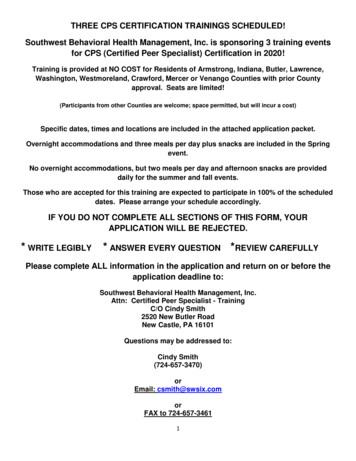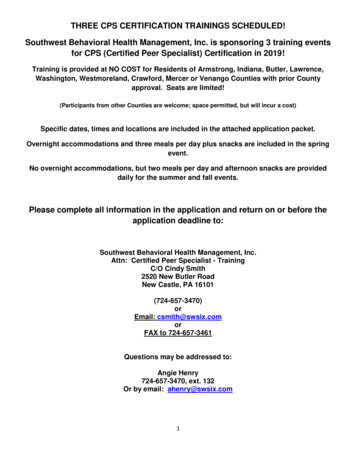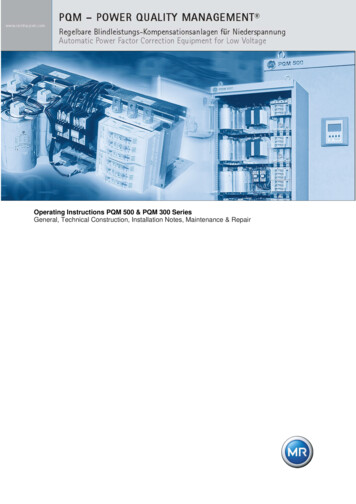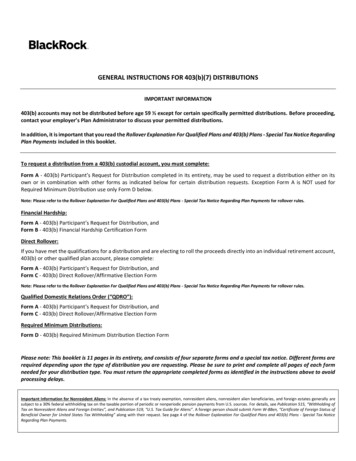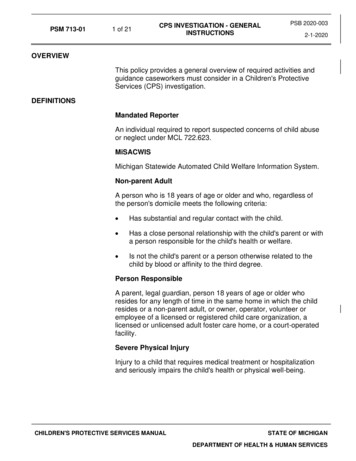
Transcription
PSM 713-011 of 21PSB 2020-003CPS INVESTIGATION - GENERALINSTRUCTIONS2-1-2020OVERVIEWThis policy provides a general overview of required activities andguidance caseworkers must consider in a Children's ProtectiveServices (CPS) investigation.DEFINITIONSMandated ReporterAn individual required to report suspected concerns of child abuseor neglect under MCL 722.623.MiSACWISMichigan Statewide Automated Child Welfare Information System.Non-parent AdultA person who is 18 years of age or older and who, regardless ofthe person's domicile meets the following criteria: Has substantial and regular contact with the child. Has a close personal relationship with the child's parent or witha person responsible for the child's health or welfare. Is not the child's parent or a person otherwise related to thechild by blood or affinity to the third degree.Person ResponsibleA parent, legal guardian, person 18 years of age or older whoresides for any length of time in the same home in which the childresides or a non-parent adult, or owner, operator, volunteer oremployee of a licensed or registered child care organization, alicensed or unlicensed adult foster care home, or a court-operatedfacility.Severe Physical InjuryInjury to a child that requires medical treatment or hospitalizationand seriously impairs the child's health or physical well-being.CHILDREN'S PROTECTIVE SERVICES MANUALSTATE OF MICHIGANDEPARTMENT OF HEALTH & HUMAN SERVICES
PSM 713-012 of 21CPS INVESTIGATION - GENERALINSTRUCTIONSPSB 2020-0032-1-2020PROCEDURECommencementCommencement must occur within 24 hours following report toCentralized Intake (CI), (MCL 722.628(1)). The priority responsecriteria determines whether the commencement must occur within12 or 24 hours; see PSM 712-4, Intake - Minimal Priority ResponseCriteria.Commencement means to begin the investigation with any activityincluding, but not limited to: Review of case history.Gathering of evidence.Case planning with supervisor.Making successful investigation contacts.Note: If using review of case history, information gained must bedocumented in the history/trends section, as well as a social workcontact indicating commencement was completed by a review ofcase history.Document commencement in MiSACWIS:1.2.3.Enter a social work contact for the accurate date and time.Select investigation commencement for purpose.Add a narrative for the activity completed.Only one social work contact should be selected ascommencement within an investigation, unless there is an acceptand link assignment to the case. See PSM 713-08, SpecialInvestigative Situations.Face-to-FaceContact withChildrenAlleged Child VictimsCaseworkers must make face-to-face contact to assess child safetyand well-being with all alleged child victims within designatedtimeframes (24 or 72 hours), as determined by the PriorityResponse Criteria; see PSM 712-4, Intake - Minimal PriorityResponse Criteria.CHILDREN'S PROTECTIVE SERVICES MANUALSTATE OF MICHIGANDEPARTMENT OF HEALTH & HUMAN SERVICES
PSM 713-013 of 21PSB 2020-003CPS INVESTIGATION - GENERALINSTRUCTIONS2-1-2020Other ChildrenDuring an investigation, caseworkers must attempt face-to-facecontact with the following other (non-victim) children: Minor children of the alleged perpetrator.Children who reside in or may visit the home of the allegedperpetrator.All children requiring contact in an investigation must be added asinvestigative persons to the case within MiSACWIS.When face-to-face contact cannot occur, document: The barriers to making contact.Contact with a person able to provide reliable informationconcerning the child's wellbeing.Forensic Interview ProtocolThe DHS Pub 779, Forensic Interviewing Protocol, should be usedto interview all age and developmentally appropriate children.Caseworkers must document use of the protocol for the interviewas well as qualitative steps outlined within the protocol. If theprotocol is not used, document the reason. Children must not beinterviewed in the presence of an alleged perpetrator (MCL722.628c).If an interview is conducted at a children's assessment center,Michigan Department of Health and Human Services (MDHHS)must not maintain copies of video/audio recording. Caseworkersshould observe and document interviews occurring at children'sassessment centers.Visual AssessmentWhen allegations include injury on the child's body, caseworkersare required to make efforts to view alleged marks, bruises or otherinjuries. No child shall be subjected to a search at a school whichrequires the child to remove his or her clothing to expose buttocks,genitalia, or a child's breasts (MCL 722.628(10)).Caseworkers may view buttocks or genitalia up to the age of 6 withparent consent and in the presence of another adult (which may bethe child's consenting parent) when allegations include injury on thechild's body. If the child is age 6 or older, caseworkers shouldrequest that the parent/caregiver take the child for a medicalCHILDREN'S PROTECTIVE SERVICES MANUALSTATE OF MICHIGANDEPARTMENT OF HEALTH & HUMAN SERVICES
PSM 713-014 of 21PSB 2020-003CPS INVESTIGATION - GENERALINSTRUCTIONS2-1-2020examination if the injury involves viewing children's breasts,genitalia, or buttocks; see PSM 713-04, Medical Examination andAssessment.Contact with Children at School or Other InstitutionCaseworkers may make contact with children at school withoutparental consent. Schools and other institutions are required tocooperate. Caseworkers must review the following with thedesignated school staff person (MCL 722.628(8) and (9)): Prior to interview, discuss the department's responsibilities andthe investigation procedure. Following the interview, discuss response the department willtake as a result of contact with the child. Sharing of informationis subject to confidentiality provisions; see SRM 131,Confidentiality.Following interview of a child at school or other institution, thecaseworker must notify a parent or guardian that the child wasinterviewed. Temporary delay is permitted, if the notice wouldcompromise the safety of the child or the child's siblings, or theintegrity of the investigation (MCL 722.628(8)).If access to the child occurs within a hospital, the investigation mustbe conducted so as not to interfere with the medical treatment ofthe child or other patients (MCL 722.628(10)).Use of Law Enforcement for Initial Face-To-Face ContactRequirementsCaseworkers must still commence an investigation within therequired priority response time when law enforcement contact isused to fulfill face-to-face contact.For more information on application and documentation ofreplacement contacts by law enforcement; see PSM 712-3,Coordination with Prosecuting Attorney and Law Enforcement.Even in situations where contact requirements are met by lawenforcement, caseworkers must take steps to ensure thesafety of the child(ren) involved.CHILDREN'S PROTECTIVE SERVICES MANUALSTATE OF MICHIGANDEPARTMENT OF HEALTH & HUMAN SERVICES
PSM 713-015 of 21PSB 2020-003CPS INVESTIGATION - GENERALINSTRUCTIONS2-1-2020Instances When Making Contact with a Child and aParent/Adult is Not HomeCaseworkers must not enter a home when an adult is not presentto provide permission to enter the home and speak with the child. Ifan adult is not present at the home, caseworkers may not requestthat the child step outside to interview them, even if the childagrees or suggests this solution.If a complaint alleges that a young child is home alone or a child isat imminent risk of harm and no adult is present in the home, thecaseworker should contact law enforcement for assistance; seePSM 713-08, Special Investigative Situations.Face-to-FaceContact withAdultsDuring an investigation, face-to-face contact must be attemptedwith the following: Legal and putative parents, guardians or caretakers who areinvolved in the care of the alleged child victim(s). Legal guardians of the alleged child victim(s). Alleged perpetrators.At minimum, a telephone contact must be attempted with thefollowing: Legal parents who are not involved in the care of all allegedchild victim(s). Other adults residing in the home with the alleged childvictim(s). Legal parents of children not identified as victims butassociated with the case.When required face-to-face or telephone contact cannot be made,caseworkers must document the barriers that prohibited thiscontact.All adults with whom face-to-face contact is required, must beadded as investigative persons to the case in MiSACWIS. Otheradults may be added as associated persons.CHILDREN'S PROTECTIVE SERVICES MANUALSTATE OF MICHIGANDEPARTMENT OF HEALTH & HUMAN SERVICES
PSM 713-016 of 21CPS INVESTIGATION - GENERALINSTRUCTIONSPSB 2020-0032-1-2020Interview RequirementsCaseworker engagement with all adults, parents and allegedperpetrators must be professional, respectful, non-judgmental, andnon-threatening.Caseworkers must display their State of Michigan identification,clearly identify themselves as representing CPS, and inform theindividuals being interviewed of the complaint allegations andidentified concerns.Interviews with the alleged victim's parents, guardians, and allegedperpetrator(s) should focus on the specific complaint allegationsand any other concerns observed or reported that may impact childsafety and/or future risk.Caseworkers must attempt to obtain the following information fromthe child's parents, guardians, and the alleged perpetrator: Verification of identity and previous names.If the person is a licensed foster care or day care provider.Native American heritage for self and child(ren).Names and dates of birth of his or her children.Friend of the Court involvement.Caseworkers must also inquire of any out of state history within theprevious 10 years for all alleged perpetrators.If the person being interviewed is the non-custodial parent of thealleged child victim, and there is a Friend of the Court order, theDHS-1450 How to Change a Parenting Time Custody Order, mustbe offered to the parent.The primary objectives of the contact with the child's parents,guardians, and the alleged perpetrator is to gather information to: Assess the complaint allegations and identify the children whomay have been involved/impacted. Assess the caregiver's ability to meet the needs of thechild(ren). Identify any immediate child safety concerns and help thefamily develop a safety plan, if warranted. Identify strengths and needs of the family and information foraccessing resources.CHILDREN'S PROTECTIVE SERVICES MANUALSTATE OF MICHIGANDEPARTMENT OF HEALTH & HUMAN SERVICES
PSM 713-017 of 21 PSB 2020-003CPS INVESTIGATION - GENERALINSTRUCTIONS2-1-2020Gather information to accurately complete risk and safetyassessments.Support PersonsOccasionally, an adult being interviewed may request a supportperson during an interview. Prior to an interview with a supportperson the caseworker must: Ensure that the request or use of a support person does notdelay or impede any necessary safety planning. Inform the support person at the beginning of the interview thatinformation obtained during the interview is confidential andthat release of this information has civil and criminal penalties. Obtain consent and necessary signatures on the DHS-860,CPS Support Person Letter.Absent ParentsCaseworkers must document efforts to identify and locate parents.The caseworker should use the Absent Parent Protocol to identifyand locate parents in an investigation.Parents Who Are IncarceratedTo locate a parent who is incarcerated, the following resources maybe used: Michigan Department of Corrections,http://www.michigan.gov/corrections. LEIN; see SRM 700, Law Enforcement Information Network. Federal prisons, http://www.bop.gov/. Out-of-state facilities, http://www.vinelink.com or contact thefacility. County jails, contact the county facilities directly.Non-parent AdultsRegardless of domicile, caseworkers must interview non-parentadults identified as alleged perpetrators.CHILDREN'S PROTECTIVE SERVICES MANUALSTATE OF MICHIGANDEPARTMENT OF HEALTH & HUMAN SERVICES
PSM 713-018 of 21CPS INVESTIGATION - GENERALINSTRUCTIONSPSB 2020-0032-1-2020Difficulty MakingContact/Unable toLocateWhen having trouble locating or contacting adults, or an entirefamily, caseworkers must make ongoing efforts to locate an adult,family, or child through actions identified in the DHS-991, DiligentSearch Checklist. All efforts must be clearly documented in socialwork contacts. Caseworkers may also contact the MDHHSassistance caseworker for assistance in locating a family; see BAM220, Case Actions.Child Found in Another StateIn instances where it is indicated that an alleged child victim or nonvictim household child is visiting or residing in another state,country, territory, etc. the following steps must be taken anddocumented in social work contacts: Verbally confirm with the adult providing care for the child, thatthe child is with them, and If the child is an alleged victim, request assistance from CPS inthe other state or jurisdiction to conduct an interview with thechild.Evidence and/or Allegations Indicate Imminent Risk of Harm tothe ChildIf the whereabouts of a child cannot be verified, and evidenceindicates that the child is at imminent risk of harm, the caseworkershould consider contacting local law enforcement in the jurisdictionwhere the child is alleged to reside. Explain why the child may be atimminent risk and request that law enforcement check on the child'ssafety.Unable to Locate Alleged Perpetrator(s)/Alleged PerpetratorRefuses to CooperateCaseworkers must make attempts to interview alleged perpetrators.When a child is at imminent risk of harm and the caseworker isunable to locate the alleged perpetrator, or the alleged perpetratoris not willing to cooperate, the caseworker must take steps toensure that the alleged perpetrator does not have contact with thechild. Caseworkers should consider safety planning with a nonoffending parent or caregiver or file a petition asking the court toremove the perpetrator from the home.CHILDREN'S PROTECTIVE SERVICES MANUALSTATE OF MICHIGANDEPARTMENT OF HEALTH & HUMAN SERVICES
PSM 713-019 of 21CPS INVESTIGATION - GENERALINSTRUCTIONSPSB 2020-0032-1-2020For information on filing a petition; see PSM 715-3, Family Court:Petitions, Hearings and Court Orders.Cases InvolvingMultiple CountiesIn cases in which parents, caregivers or children are located inother counties, requests for courtesy contacts must behonored. Courtesy caseworkers and supervisors should beassigned within MiSACWIS. All activities completed by the courtesyworker must be documented in social work contacts.Disputes between counties must be referred to the appropriatebusiness service center director(s) for resolution.When Families in CPS Cases Move or Visit Out of CountyWhen a family with an active CPS investigation moves or istemporarily visiting outside of the assigned county of responsibility,caseworkers in the assigned county and the county where thefamily now resides, should communicate to discuss the nature ofthe active CPS investigation. Caseworkers should coordinate toensure timely completion of investigation requirements and ensurechild safety. If the family is living in another county temporarily, theassigned county of responsibility should outline the need forcourtesy interviews and referral of services and request thesebe completed by the county of temporary residence. Thecounty of responsibility will continue to maintain the case untilthere is confirmation that the family has moved permanently. If the family has moved to a new county, the supervisor musttransfer the active CPS investigation in MiSACWIS to the newcounty of residence for the family.Disputes between counties must be referred to the appropriatebusiness service center director(s) for resolution.Safety PlanningCaseworkers must consistently assess the safety and need forprotection of all children during an investigation. Safety plans must: Address immediate safety concerns (a safety plan is not atreatment plan).CHILDREN'S PROTECTIVE SERVICES MANUALSTATE OF MICHIGANDEPARTMENT OF HEALTH & HUMAN SERVICES
PSM 713-0110 of 21PSB 2020-003CPS INVESTIGATION - GENERALINSTRUCTIONS2-1-2020 Be developed with the input and assistance of parents, familymembers and tribe (if applicable). Include formal and informal supports and services. Be realistic, achievable, and understood by theparent/caregiver. Specify roles and expectations of pertinent individuals involvedin the plan. Be modified as other safety concerns arise. Build on the strengths of the parent/caregiver.Safety plans must be documented within a social work contact.Temporary Voluntary ArrangementsA parent with physical custody or a legal guardian may decide toallow their child to temporarily stay with the other parent, a relativeor friend. This may occur when a temporary arrangement is neededto ensure child safety.Instances when a temporary voluntary arrangement may beappropriate are: While the CPS investigation is conducted and the safety of thechild in the home is uncertain. Until services can begin. Until the family can complete a task (for example, removing firehazards in the home).A parent with physical custody or legal guardian must initiate andagree with the temporary voluntary arrangement.When a caseworker identifies safety concerns that do notnecessitate court involvement, and the parent decides to allow hisor her child to stay in a voluntary temporary arrangement, theMDHHS-5433, Voluntary Safety Arrangement, should becompleted, signed, and uploaded in MiSACWIS.Voluntary arrangements may not be used in lieu of filing a petitionwhen the CPL requires that a petition be filed; see PSM 715-3,Family Court, Petitions, Hearings and Court Orders.CHILDREN'S PROTECTIVE SERVICES MANUALSTATE OF MICHIGANDEPARTMENT OF HEALTH & HUMAN SERVICES
PSM 713-0111 of 21CPS INVESTIGATION - GENERALINSTRUCTIONSPSB 2020-0032-1-2020Service ProvisionWhen a child can remain safely in his/her own home with services,include caregivers in planning services that build on parentalstrengths. Identify and implement services that will adequatelyprevent harm to the child by supporting the family. Intensive homebased services should be made available to families within 24hours to alleviate risk and stabilize the family.Services may be continued without initiating legal action if a childcan remain in his/her own home safely, and the caregivers arewilling and able to voluntarily participate in services to improveconditions for the child.Relative care and/or other family resources may provide support toparents as they improve their skills and work with services; seePSM 714-1, Post-Investigative Services.Collateral ContactsCollateral contacts should be made to thoroughly assess complaintallegations regarding the child(ren)'s safety. Examples ofindividuals who may be able to provide pertinent information are: Witnesses to the alleged abuse/neglect.Relatives and friends.Non-parent adults.Teachers/other school staff.Medical provider(s).Mental health provider(s).Neighbors.Reporting person(s).Service providers.Caseworkers should request reports from law enforcement, mentalhealth providers, physicians, emergency medical services (EMS),and other entities, when applicable to the investigation. Reportsshould be summarized in a social work contact and uploaded intothe document section within MiSACWIS.Requesting Medical and Mental Health Record InformationThe Child Protection Law, the Public Health Code (MCL 333.2640& 333.16281) and the Mental Health Code (MCL 330.1748a)provide the legal authority and obligation for medical and mentalhealth providers to share their records with CPS during anCHILDREN'S PROTECTIVE SERVICES MANUALSTATE OF MICHIGANDEPARTMENT OF HEALTH & HUMAN SERVICES
PSM 713-0112 of 21CPS INVESTIGATION - GENERALINSTRUCTIONSPSB 2020-0032-1-2020investigation of suspected child abuse or neglect, even without theclient's consent.CPS must request the records
the person's domicile meets the following criteria: Has substantial and regular contact with the child. . Caseworkers must not enter a home when an adult is not present to provide permission to enter the home and speak with the child. If an adult is not present at the home, caseworkers may not request .File Size: 341KB
